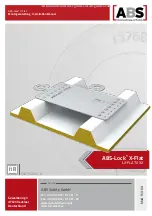
9
MOUNTING THE STRONGHOLD ON YOUR LATHE.
It is important that your chuck is put on your lathe properly. Proceed as fol-
lows:
After mounting the adaptor to the chuck, carefully screw the assembly onto
your lathe spindle. It should go on smoothly without excessive play or bind-
ing. Screw it all the way on until the adaptor face contacts the spindle shoul-
der. Next, lock your spindle, and unscrew the chuck just slightly so you can
give it a firm swift spin, consequently snapping the chuck home.
Alternatively, a piece of wood can be tightened in the top jaws crosswise,
and with the palm of your hand, bump the chuck home.
To remove, reverse the above procedure.
WARNING:
Do not put a steel bar in the holes of the chuck body, as this may cause dam-
age to the holes and/or the scroll.
chuck body, you may not be able to remove the screws from the adaptor. Do
not forcibly remove, but take the following action: first turn the screws in
further; then, using a file or grinder, remove the first squashed thread. You
will now be able to remove the screws without damaging the taperlock adap-
tor.
8
R
EMOVING THE ADAPTOR
1. Remove the two tightening screws and thread them into the two tapped
holes of the adaptor. They now become jack screws.
2. Carefully tighten alternately until the adaptor pops loose from the taper.
CAUTION: If a lot of force is required to remove the adaptor, the screws
may flatten and compress the first thread. After the adaptor is out of the
M
OUNTING THE ADAPTOR: --(your adaptor may already be mounted)--
1. Wipe the inside of the taper of the chuck body as well as the outside of
the adaptor to be sure all grit and dirt is removed.
2. Slide the adaptor into the chuck body with the counter-bored holes of the
adaptor lined up with the threaded holes of the chuck body.
3. Thread in the M5 x 20 hex socket screws and with the 4mm T-handle hex
key and tighten them alternately. Alternate tightening ensures the the adaptor
is pulled into the taper straight.
Mounting and Removing the Adaptor.
Note that there are four holes in the adaptor. Two of these holes are counter-
bored and are not threaded. These are used to pull the adaptor into the
tapered chuck body (and hold it there). The other two holes are not counter-
bored, but are threaded. These are used as jack screws if the adaptor needs to
be removed.
SECTION 2 - GETTING STARTED































